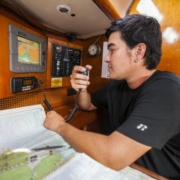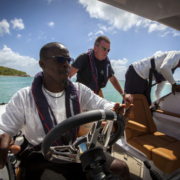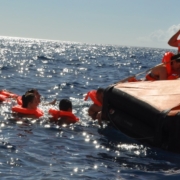STCW10 Updating or Renewal Courses
Seafarers who hold an existing Personal Survival Techniques (PST) certificate and Fire Prevention and Fire Fighting certificate (FPFF) are required to complete this updating training course every 5 years to maintain proficiency under the STCW 2010 Manila Amendments (STCW Section A-VI/1 and table A-VI/1-1).
Ondeck delivers both of these MCA approved STCW Updating courses. Each is conducted over a full day period by our qualified and highly experienced maritime instructors.
Though not mandatory for STCW, many organisations, including the RYA, require the First Aid Certificate to be updated every 2 or 3 years to remain current in their qualification. This course is also ideal for any seafarer who wishes to keep their first aid skills and knowledge up to date allowing them to remain competent and confident in applying basic life saving techniques. This would be an extra day in addition to the above
Fire prevention and Fire Fighting Updating - $245usd pp or take both together for $675usd pp.
Under the STCW 2010 requirements for training and certification, updated proficiency training will need to be undertaken in fire prevention and firefighting every five years. Section A-VI/1 of the STCW Code (paragraph 3) states that ‘Seafarers qualified in accordance with paragraph 2 in basic training shall be required, every five years, to provide evidence of having maintained the required standard of competence, to undertake the tasks, duties and responsibilities listed in column 1 of table A VI/1-2.’
This is a practical one-day fire course involving use of hoses, nozzles and extinguishers, as well as breathing apparatus inside the fire unit, both in restricted visibility and hot fire conditions.
Subjects covered in this practical module include:
Use of portable fire extinguishers on appropriate fire types
Use of fire blankets
Use of hoses, nozzles and hose equipment
Extinguish fires as a member of a team
Test and use BA and associated equipment
Safe door opening procedures, ladder use, search procedures, rescue techniques and evacuation in reduced visibility
Casualty rescue, communication and team work within a smoke-filled or hostile environment
Fighting fires in an accommodation or engine room area in heavy smoke
On successful completion of this course the student will receive an MCA approved STCW Updating Proficiency in Fire Prevention and Fire Fighting (STCW Regulation A-VI/1-2) certificate
PST – Personal Survival Techniques Updating - $275usd pp or take both together for $575usd pp.
Under the STCW 2010 requirements for training and certification, updated proficiency training will need to be undertaken in personal survival techniques every five years. Section A-VI/1 of STCW (paragraph 3) states that ‘Seafarers qualified in accordance with paragraph 2 in basic training shall be required, every five years, to provide evidence of having maintained the required standard of competence, to undertake the tasks, duties and responsibilities listed in column 1 of table A VI/1-1.’
Put simply, all seafarers who hold an existing personal survival techniques (PST) certificate are required to complete this updating training course every 5 years. This one-day course covers both theoretical and practical elements of PST.
Subjects covered in this module include:
Emergency situations such as collision, fire and flooding.
Different types of life-saving appliances carried on ships.
Equipment in survival craft.
Location of personal life-saving appliances.
Principles concerning survival at sea.
Donning (putting on) a life jacket.
Immersion suits.
Safely jumping from a height into the water.
Righting an upturned life raft while wearing a life jacket.
Swimming while wearing a life jacket and keeping afloat.
Boarding a life raft from a ship or the water while wearing a life jacket.
Taking initial actions on boarding a survival craft to enhance chance of survival.
Streaming a sea anchor.
Recovering an injured person to a survival craft.
On completion of this course the student will receive an MCA approved STCW Updated certificate in Personal Survival Techniques (STCW Regulation A-VI/1-1).
Please click on the 'Training Dates & Booking' button on the right to check available dates.



